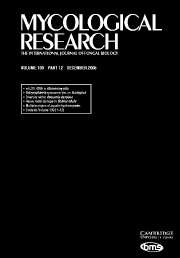Crossref Citations
This article has been cited by the following publications. This list is generated based on data provided by
Crossref.
Bronick, C.J.
and
Lal, R.
2005.
Soil structure and management: a review.
Geoderma,
Vol. 124,
Issue. 1-2,
p.
3.
Wuest, Stewart B.
Caesar-TonThat, T.C.
Wright, Sara F.
and
Williams, John D.
2005.
Organic matter addition, N, and residue burning effects on infiltration, biological, and physical properties of an intensively tilled silt-loam soil.
Soil and Tillage Research,
Vol. 84,
Issue. 2,
p.
154.
Rillig, Matthias C.
and
Mummey, Daniel L.
2006.
Mycorrhizas and soil structure.
New Phytologist,
Vol. 171,
Issue. 1,
p.
41.
Darboux, F.
and
Le Bissonnais, Y.
2007.
Changes in structural stability with soil surface crusting: consequences for erodibility estimation.
European Journal of Soil Science,
Vol. 58,
Issue. 5,
p.
1107.
Sarkhot, Deoyani V.
Comerford, N. B.
Jokela, Eric J.
Reeves, James B.
and
Harris, Willie G.
2007.
Aggregation and Aggregate Carbon in a Forested Southeastern Coastal Plain Spodosol.
Soil Science Society of America Journal,
Vol. 71,
Issue. 6,
p.
1779.
Caesar-TonThat, T.C.
Caesar, A.J.
Gaskin, J.F.
Sainju, U.M.
and
Busscher, W.J.
2007.
Taxonomic diversity of predominant culturable bacteria associated with microaggregates from two different agroecosystems and their ability to aggregate soil in vitro.
Applied Soil Ecology,
Vol. 36,
Issue. 1,
p.
10.
Caesar-TonThat, T.C.
Busscher, W.J.
Novak, J.M.
Gaskin, J.F.
and
Kim, Y.
2008.
Effects of polyacrylamide and organic matter on microbes associated to soil aggregation of Norfolk loamy sand.
Applied Soil Ecology,
Vol. 40,
Issue. 2,
p.
240.
Caesar-TonThat, TheCan
Lenssen, Andy W.
Caesar, Anthony J.
Sainju, Upendra M.
and
Gaskin, John F.
2010.
Effects of tillage on microbial populations associated to soil aggregation in dryland spring wheat system.
European Journal of Soil Biology,
Vol. 46,
Issue. 2,
p.
119.
Barrico, Lurdes
Rodríguez-Echeverría, Susana
and
Freitas, Helena
2010.
Diversity of soil basidiomycete communities associated with Quercus suber L. in Portuguese montados.
European Journal of Soil Biology,
Vol. 46,
Issue. 5,
p.
280.
Tobiašová, Erika
2011.
The effect of organic matter on the structure of soils of different land uses.
Soil and Tillage Research,
Vol. 114,
Issue. 2,
p.
183.
Day, Melissa J.
and
Currah, Randolph S.
2011.
In vitro degradation of the moss Hylocomium splendens by three pleosporalean fungi.
Canadian Journal of Microbiology,
Vol. 57,
Issue. 5,
p.
382.
Caesar-TonThat, TheCan
Sainju, Upendra M.
Wright, Sara F.
Shelver, Weilin L.
Kolberg, Robert L.
and
West, Mark
2011.
Long-term tillage and cropping effects on microbiological properties associated with aggregation in a semi-arid soil.
Biology and Fertility of Soils,
Vol. 47,
Issue. 2,
p.
157.
Srivastava, Pankaj Kumar
Shenoy, Belle Damodara
Gupta, Manjul
Vaish, Aradhana
Mannan, Shivee
Singh, Nandita
Tewari, Shri Krishna
and
Tripathi, Rudra Deo
2012.
Stimulatory Effects of Arsenic-Tolerant Soil Fungi on Plant Growth Promotion and Soil Properties.
Microbes and Environments,
Vol. 27,
Issue. 4,
p.
477.
Le Guillou, C.
Angers, D.A.
Maron, P.A.
Leterme, P.
and
Menasseri-Aubry, S.
2012.
Linking microbial community to soil water-stable aggregation during crop residue decomposition.
Soil Biology and Biochemistry,
Vol. 50,
Issue. ,
p.
126.
Tisdall, Judith M.
Nelson, Sam E.
Wilkinson, Kevin G.
Smith, Sally E.
and
McKenzie, Blair M.
2012.
Stabilisation of soil against wind erosion by six saprotrophic fungi.
Soil Biology and Biochemistry,
Vol. 50,
Issue. ,
p.
134.
Daynes, Cathal N.
Zhang, Ning
Saleeba, Jennifer A.
and
McGee, Peter A.
2012.
Soil aggregates formed in vitro by saprotrophic Trichocomaceae have transient water-stability.
Soil Biology and Biochemistry,
Vol. 48,
Issue. ,
p.
151.
Daynes, Cathal N.
Field, Damien J.
Saleeba, Jennifer A.
Cole, Michael A.
and
McGee, Peter A.
2013.
Development and stabilisation of soil structure via interactions between organic matter, arbuscular mycorrhizal fungi and plant roots.
Soil Biology and Biochemistry,
Vol. 57,
Issue. ,
p.
683.
Rasche, Frank
and
Cadisch, Georg
2013.
The molecular microbial perspective of organic matter turnover and nutrient cycling in tropical agroecosystems - What do we know?.
Biology and Fertility of Soils,
Vol. 49,
Issue. 3,
p.
251.
Shan, Yi N.
Chen, Jin H.
Wang, Lei
Li, Fan
Fu, Xiao H.
and
Le, Yi Q.
2013.
Influences of adding easily degradable organic waste on the minimization and humification of organic matter during straw composting.
Journal of Environmental Science and Health, Part B,
Vol. 48,
Issue. 5,
p.
384.
Caesar-TonThat, The Can
Espeland, Erin
Caesar, Anthony J.
Sainju, Upendra M.
Lartey, Robert T.
and
Gaskin, John F.
2013.
Effects of Agaricus lilaceps Fairy Rings on Soil Aggregation and Microbial Community Structure in Relation to Growth Stimulation of Western Wheatgrass (Pascopyrum smithii) in Eastern Montana Rangeland.
Microbial Ecology,
Vol. 66,
Issue. 1,
p.
120.




